Neverwinter Nights 2 Review
Neverwinter Nights 2
Don your armour and ready that broadsword. Neverwinter Nights 2 is classic RGB like your orc mamma used to make.
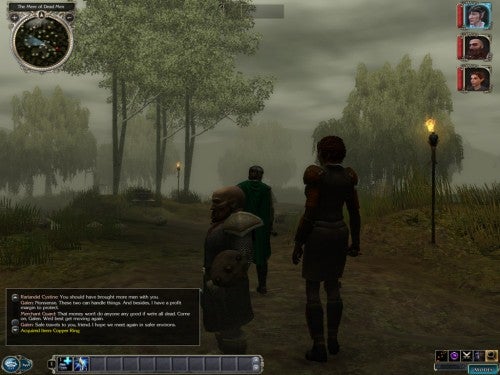
Verdict
Key Specifications
- Review Price: £24.99
Is this the last of the big fantasy RPG dinosaurs? Sandwiched between World of Warcraft and the big online blockbusters on the one side and widescreen, action-oriented epics like The Elder Scrolls IV: Oblivion, Neverwinter Nights 2 feels like it belongs to a dying breed: the classic computer RPG. OK, so it’s a proud breed, its lineage stretching back through Baldur’s Gate and Fallout to Ultima, Eye of the Beholder and the old gold box AD&D RPGs, but it’s a breed whose time came long ago, and now seems to be going fast. I mention this upfront because your response to NWN2 will depend a lot on your experience of these earlier games. If you’re a dyed-in-the-wool RPG nut who’s been playing the things for eons, you’re going to love it. If you’re an RPG newbie looking for the next big hit after Oblivion, this might not be the game you’re looking for. 
Why? Well, this is a game where an understanding of the hallowed traditions is part of the pleasure – the plot couldn’t be any more old-school if it tried. Young lad of mysterious parentage? Check. Dramatic raid on village by forces unknown? Check. Lad sent off on quest with unidentified object? Check. Lad meets up with wandering adventurers who are only too eager to accompany him? Check. Makeshift party becomes embroiled in plot of fiendish dark forces? Check. The fact that Obsidian – the guys who brought you Knights of the Old Republic 2 – are able to transform this mess of clichés into something not just engaging but actually intriguing is testament to their skill with a script. However, I’m not sure if it works nearly so well if you don’t already have some nostalgia for the well-worn ways of the classic fantasy RPGs.
The same holds when you get to the gameplay. Some knowledge of the rules and general mechanics of Dungeons & Dragons – either gleaned from earlier games or the old-school paper and pencil product – is definitely going to help, as will considerable experience of other computer RPGs. There are a lot of floating menus, character profiles and inventories to deal with here, and while they’re well laid out and steadily introduced by an entertaining tutorial sequence, they hardly make for a pick up and play game. In fact, as the plot of NWN2 unravels, previous D&D experience proves crucial; if you don’t know when to use rogues to disarm traps and unlock chests or when to save or bring out the sorcerous heavy artillery, then you could be in for a tough haul. Even character progression is a complex affair. Sure, you can ask the game to recommend new skills or spells as your characters level up – and context-sensitive explanations are always just a mouse over or click away – but optimising your character’s choices demands some grasp of the way in which the underlying D&D game works.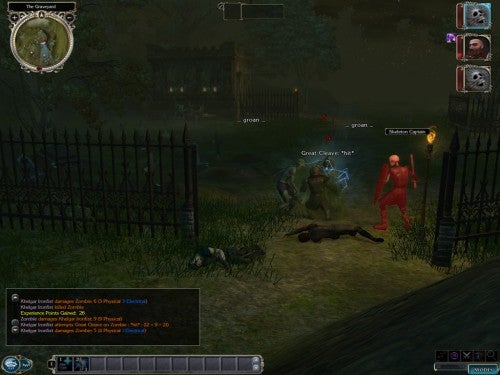
Of course, in order to level you’ll also need to fight. Now, NWN2 isn’t nearly as combat-heavy as, say, the Icewind Dale games, but it does involve a lot of bloodshed, and they’re all played out in true old-school fashion. Real-time thrust and parry isn’t part of the picture – here it’s all about making a disparate group of adventurers fight as a team. Now, the combat is pretty much point and click, bar casting spells, using potions and changing weapons, and if you want to concentrate on your hero, the other members of your party will take pretty good care of themselves. In fact, the AI system does a creditable job of selecting targets, using spells and handling health (though getting from one side of the door to another still proves occasionally problematic).
All the same, there are situations where you need to take control to survive. As with Baldur’s Gate and the Knights of the Old Republic games, combat normally develops in real-time. However, at any moment you can press space to pause the action, issue orders or set-up spells, and then press space to unpause and move on. In small scale scraps, this isn’t vital, and in fact you’ll occasionally see your party win fights with little or no intervention. However, when dealing with larger groups of enemies or particularly powerful foes, the space key is undoubtedly your best friend. This was an effective system in the aforementioned titles, and it’s an effective system here, but will it suit the non-RPG players who embraced Oblivion? No.
And these same gamers will be left just as unimpressed with the graphics. Okay, so they’ve come on a long way since last time – with bumpy normal-mapped textures applied to most surfaces, real-time lighting and shadowing effects and much more rounded character models – but we’re still not talking cutting-edge stuff. If you’re used to the detailed towns, grassy valleys and misty tombs of Cyrodil, prepare for a shock: though it has explosions and magic bursts a-plenty, NWN2 doesn’t deliver half the same amount of eye-candy.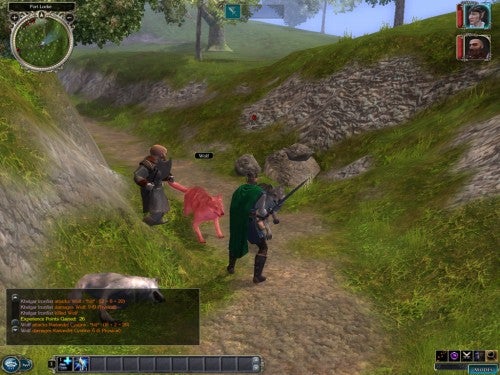
In other words, NWN2 is slightly old-fashioned, fairly complex and demanding, and it’s not even immediately accessible. It’ll be three or four hours in before it really registers that you’re actually enjoying it. What’s worse, there are still odd issues with crazy AI and lousy pathfinding, and – until patched – my copy had a horribly tendency to crash out during area transitions or while saving. Why bother?
For the TPG faithful, the answer’s too easy: because NWN2 is the sort of game that can immerse you in a world and hold you there for hour after hour. Even if this is the last of the dinosaurs, it sits near the pinnacle of their evolution. For one thing, Obsidian seem to understand the genre inside out. They know how an RPG should develop, starting off small and slowly offering a taste of greater powers. You hit a few dungeons, make a few friends, glimpse a few enemies, and before long you feel involved in larger affairs. Guess what – you’re hooked. What are those evil-looking shadow priests up to? What is this mysterious shard that you’re carrying? What will happen when you take it to Neverwinter? Why not carry on playing for a few more hours (make that days) and find out?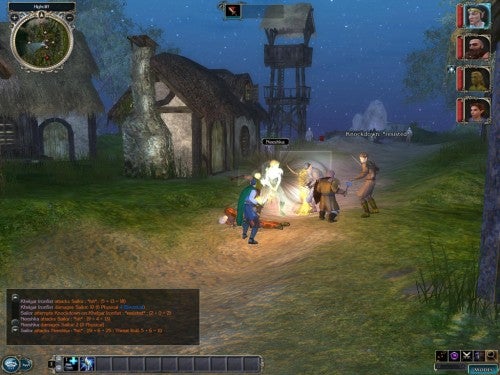
What’s more, the script is brilliant. Like their close friends at Bioware, Obsidian know that an interesting party isn’t one comprised of dull heroes that all bond tightly then fight as one for a common cause. No, an interesting party is made up of a bunch of mildly neurotic and psychotic individuals who can’t stop bickering for a second. As a result, even the most tedious bit of exposition is livened up by spiteful put-downs and witty comebacks, and the more you get to know them, the more likeable your allies become. I suspect this is a big part of why the otherwise clichéd quest is so enjoyable.
Of course, it’s up to you to decide whether play peacemaker or stir up additional trouble, because NWN2 gives you plenty of scope to play the game your own way. Perhaps it’s not as pronounced as it is in the Knights of the Old Republic games, but NWN2 still gives you a real sense that your behaviour, your dialogue choices and the side-missions you take or refuse have an impact on your party and on the way the game progresses as a whole. I’ve taken the easy-going but generally good approach in my own game, but there’s no reason why you can’t play nasty if you want to, or play a stuck-up prig if that takes your fancy. Some tasks might be easier, some might be harder, and part of the fun is finding out for yourself.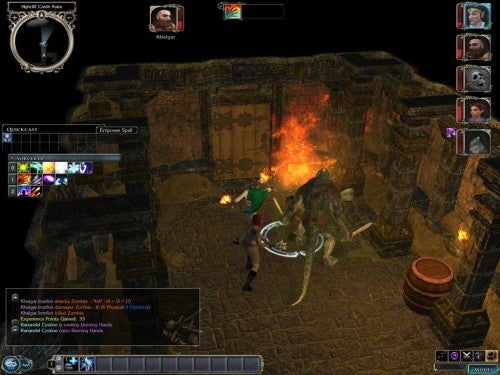
Above all else, I suspect that will win NWN2 its biggest fans and keep them long term is simple: it checks all the right boxes for the old-school RPG player. Levelling up, equipping new armour, spells and magic weapons is as addictive a business as it ever was, but what keeps you playing is something less tangible – the feel. NWN2 has the character of tabletop D&D down pat. You sneak down the corridor, checking for and disarming traps, then storm into a room to find a priest raising zombie hordes at a his unholy altar. You press space, send your dwarf fighter charging in and have your sorcerer brewing up something explosive, press space again, and it all comes together. NWN2 is as close as you’ll get to D&D without unearthing your old geeky mates and getting them in for a session.
But then there’s nothing to stop you doing so if that’s what you want. Like its predecessor, NWN2 is built from the ground up for multiplayer, and whether you play the campaign alone or with friends makes little difference. And once it’s over, the game still has longevity, thanks to the mildly bewildering but comprehensive toolset. The original Neverwinter Nights brought the total D&D experience – dungeon masters, fan-created modules, official expansions – to the computer, and the fact that DMs could create and manage new adventures, then unleash them on the wider NWN2 community was a huge part of the game’s lasting appeal. Even this year, four years after its release, new community-created modules were arriving. I wouldn’t bet against that holding true for the sequel.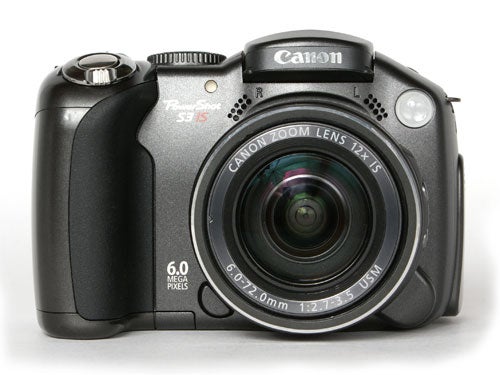
Is this the last of a dying breed? Maybe, but it’s going out not with a gasp, but with a song. NWN2 is a reminder of all that was once good about the classic RPG, and what will continue to be good while this game and its community lasts. It’s not a game for everyone, but if you loved the old-school D&D epics and mourn their passing, then this is the best wake you could imagine.
Verdict
Defiantly old-school, the single-player campaign is a superb example of the classic RPG. And with the tools and the community behind it, there’s no reason why it can’t be something more.

